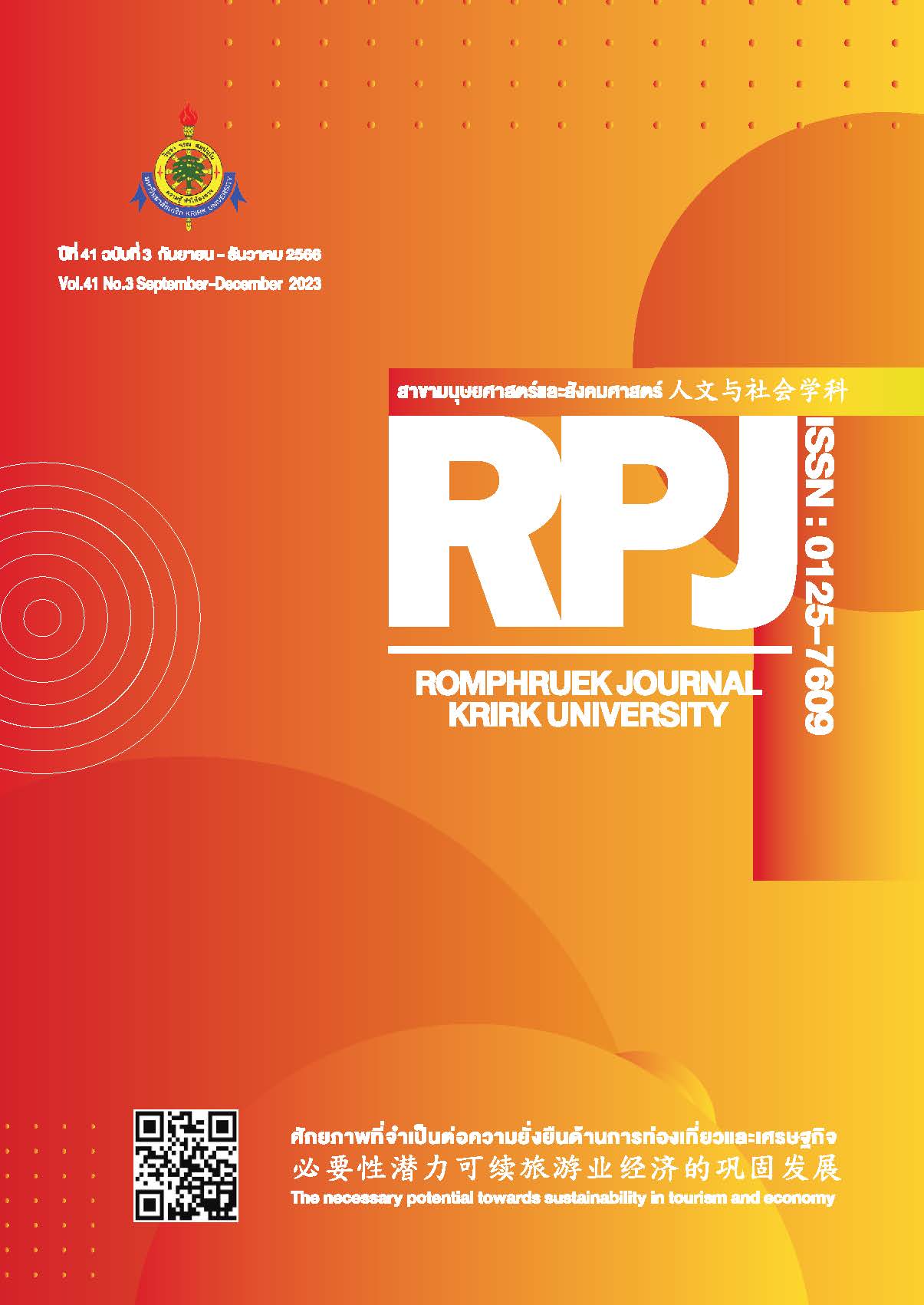Brand Equity Affecting the Brand Loyalty of Thai Tourists in Selecting the Boutique Hotel in Phuket Province
Main Article Content
Abstract
The objectives of this survey research was to find out how Thai tourists responded to brand equity, brand loyalty, and how brand equity affected brand loyalty of Thai tourists in selecting the boutique hotel in Phuket. The sample was made up of 424 people using a two-stage sampling method. The questionnaire served as the research tool. The data received were analyzed using frequency, percentage, mean, standard deviation, and multiple regression analysis.
The results revealed that the overall opinions of the majority of the respondents on brand equity and brand loyalty were at the agreed level (=4.34, 4.24). According to the weight of the impact results, the brand equity had an impact on the brand loyalty in descending order, as follows: physical service quality (Beta=.390), lifestyle congruence (Beta=.367), ideal self-congruence (Beta=.173), and service quality behavior of the staff (Beta=.102) at statistically significant level of .05. Additionally, the result showed that the multiple regression analysis had an Adjusted R Square coefficient of 71.2%, demonstrating that one-sided brand equity could predict a 71.2 % variation in brand loyalty. Other variables were responsible for the remaining 28.8%.
Article Details

This work is licensed under a Creative Commons Attribution-NonCommercial-NoDerivatives 4.0 International License.
Every article published in the Romphruek Journal of the Humanities and Social Sciences is the opinion and point of view of the authors. Thery're not the viewpoint of Krirk University or the editored department. Any part or all of the articles for pablication must be clearly cited.
References
กัลยา วานิชย์บัญชา. (2549). สถิติสำหรับงานวิจัย (พิมพ์ครั้งที่ 2). โรงพิมพ์จุฬาลงกรณ์มหาวิทยาลัย.
กัลยา วานิชย์บัญชา. (2550). การวิเคราะห์สถิติ สถิติสำหรับบริหารและงานวิจัย (พิมพ์ครั้งที่ 10). โรงพิมพ์จุฬาลงกรณ์มหาวิทยาลัย.
ชิษณุพงศ์ ธนพิบูลพงศ์. (2565). พฤติกรรมการเลือกใช้บริการโรงแรมของนักท่องเที่ยวในเขตพื้นที่ตําบลหมื่นไวย อําเภอเมือง จังหวัดนครราชสีมา. วิทยาการจัดการ, 1(1), 83-96.
ธนา ตุลยกิจวัตร. (2565, 26 ธันวาคม). ส่องท่องเที่ยวภูเก็ตเริ่มฟื้นตัว ธุรกิจโรงแรมเร่งเครื่องเพิ่มห้องพักรับนักท่องเที่ยวต่างชาติกลับมาเยือนไท. นิตยสารไทยแลนด์พลัส (thailandplus). https://www.thailandplus.tv/archives/652218.
นิมิต ซุ้นสั้น. (2562). การทดสอบความสัมพันธ์คุณค่าตราสินค้า ต่อความพึงพอใจลูกค้า และความภักดีตราสินค้าในโรงแรมแบบบูติก. การท่องเที่ยวไทยนานาชาติ, 15(2), 138-160.
บุญชม ศรีสะอาด. (2545). การวิจัยเบื้องต้น. (พิมพ์ครั้งที่ 6). บริษัท สุวีริยาสาสน์ จำกัด.
เบญนภา จันทร์กลับ. (2554). แนวโน้มการพัฒนารูปแบบโรงแรมบูติค: กรณีศึกษาโรงแรมเขตอำเภอหัวหิน-ชะอำ (วิทยานิพนธ์ปริญญามหาบัณฑิต, จุฬาลงกรณ์มหาวิทยาลัย). CHULALONGKORN UNIVERSITY INTELLECTUAL REPOSITORY. http://cuir.car.chula.ac.th/handle/123456789/29662.
ผู้จัดการออนไลน์. (2564, 4 ตุลาคม). พักบูติกภูเก็ตดิ้นหนีโควิด-19 หลังกระทบหนักปิดไปกว่า 80% ปรับตัวสร้างจุดขายเน้นท่องเที่ยวเชิงประสบการณ์ เข้าถึงวิถีชุมชน ดึงคนพัก. ผู้จัดการออนไลน์ (mgronline). https://mgronline.com/south/detail/9640000055192.
พนิตสุภา ธรรมประมวล. (2563). การตลาดการบริการ. บริษัท พี.เอ.ลิฟวิ่ง จำกัด.
พัฐรัศมิ์ ว่องไชยกุล ชานนท์ คล่องแคล่ว และวัฒนพงศ์ จัยวัฒน์. (2565, 26 ธันวาคม). Boutique Hotel Generation โรงแรมบูติก…จากวันวาน ถึงวานนี้. นิตยสารโพซิชั่นนิ่ง (positioningmag). https://positioningmag.com/6621.
ระชานนท์ ทวีผล. (2560). แนวคิดและการดำเนินธุรกิจของโรงแรมบูติคในเขตเทศบาลนครเชียงใหม่ อำเภอเมืองเชียงใหม่ จังหวัดเชียงใหม่. วิทยาลัยดุสิตธานี, 11(1), 116-132.
ระชานนท์ ทวีผล และธีระวัฒน์ จันทึก. (2561). การให้บริการแบบมืออาชีพของโรงแรมประเภทบูติค ในเขตอำเภอชะอำ จังหวัดเพชรบุรี และเขตอำเภอหัวหิน จังหวัดประจวบคีรีขันธ์. วไลยอลงกรณ์ในพระบรมราชูปถัมภ์, 12(1), 1-14.
วรพันธุ์ คล้ามไพบูลย์. (2557). เปลี่ยนบ้านเก่าเป็นบูติคโฮเทล เลขที่ 1. สำนักพิมพ์ซุปเปอร์กรีน.
ศิมาภรณ์ สิทธิชัย และ สิญาธร ขุนอ่อน. (2558). การวัดความภักดีของลูกค้าสำหรับธุรกิจโรงแรม. นักบริหาร, 35(1), 64-74.
ศิริวรรณ เสรีรัตน์. (2541). การบริหารเชิงกลยุทธ์. สำนักพิมพ์พัฒนาศึกษา.
ศูนย์วิจัยด้านการตลาดด้านการท่องเที่ยว การท่องเที่ยวแห่งประเทศไทย. (2564, 16 กันยายน). สถานการณ์ท่องเที่ยวภายในประเทศพื้นที่ภูเก็ต ประจำเดือนกันยายน 2564. ศูนย์วิจัยด้านการตลาดด้านการท่องเที่ยว การท่องเที่ยวแห่งประเทศไทย (TAT Intelligence Center). https://econtent.tat.or.th/MarketingInfo/province?id=THA377.
สิน พันธุ์พินิจ. (2549). เทคนิคการวิจัยทางสังคมศาสตร์. (พิมพ์ครั้งที่ 2). บริษัท วิทยพัฒน์ จำกัด.
สุชาติ ประสิทธิ์รัฐสินธุ์. (2543). ระเบียบวิธีการวิจัยทางสังคมศาสตร์. บริษัท เฟื่องฟ้าพริ้นติ้งจำกัด.
สุพจน์ ปงคำเฟย และ สุริยา ส้มจันทร์. (2558). การยกระดับคุณภาพการให้บริการของบุคลากรแผนกแม่บ้านในธุรกิจโรงแรมบูติค ในจังหวัดเชียงราย. อารยธรรมศึกษาโขง-สาละวิน, 6(1), 182-202.
Aaker, D. A. (1991). Managing brand equity: Capitalizing on the value of a brand name. Free.
Aaker, D. A. (1996). Building strong brands. Free.
Balekjian, Cristina and Lara Sarheim. (2011). Boutique Hotel Segment: The Challenge of Standing Out from The Crowd. HVS September.
Braun, Tiffany M. (2017). A case study on the emergence of boutique and lifestyle hotels. [Unpublished master’s thesis]. University of Nevada, Las Vegas.
Danis, Aanbela. (2007). Marketing and Innovation: Useful Tools for Competitiveness in Rural and Peripheral Areas. European Planning Studies, 14(1), 1-17.
Keller, K. L. (1993). Strategic brand management, building, measuring, and managing brand Equity. Prentice Hall.
Kotler, P., & Keller, L.K. (2009). Marketing management. (13th ed.). Pearson Prentice Hall.
McIntosh, A.J. and Siggs, A. (2005). An exploration of the experiential nature of boutique accommodation. Travel Research, 44(1), 74-81.
Michman, R. D. (1991). Lifestyle Market Segmentation. Praeger.
Mohd Noor, I. et al. (2014). Characteristic of Boutique Hotel: Parameters of Attraction. Conference paper originally proceeding at the 5th International Conference on Business and Economic Research (5th ICBER 2014), published in Kuching, Sarawak, Malaysia, 24 -25 March 2014, 720-726.
Parasuraman, A., Berry, L. L. & Zeithaml, V. A., (1990). Delivering quality service: Balancing customer perceptions and expectations. The free press.
Qawasmeh, R. (2016). Role of the Brand Image of Boutique Hotel for Customers Choosing Accommodation, “LE CHATEAU LAMBOUSA” Case Study, North Cyprus. Hotel & Business Management, 5(2), 147-156.
Rovinelli, R. J., & Hambleton, R. K. (1977). On the use of content specialists in the assessment of criterion-referenced test item validity. Dutch Educational Research, 2(2), 49-60.
Shemwell, D. J., Yavas, U., and Bilgin, Z. (1998). Customer-Service Provider Relationships: An Empirical Test of a Model of Service Quality. The Satisfaction and Relationship Oriented Outcomes, 9(2), 155–168.


